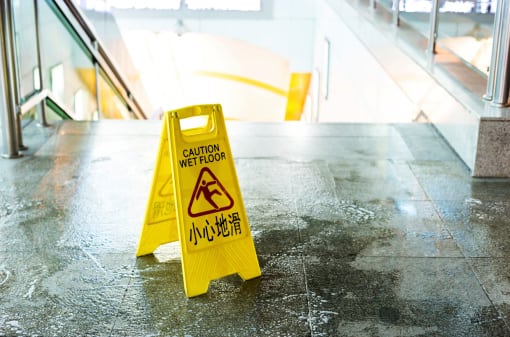
Premises liability insurance protects businesses and property owners from any legal claims that may arise from personal injuries or property damage that occurs on their premises. If you are a landowner or leaseholder, you are legally responsible for any person lawfully entering the property. Premises liability insurance is available to provide coverage should you be found responsible, i.e., negligent, for another person’s injuries or property damage while in your store or on your land. By law, every property owner or persons in possession and control of a property has a “duty of reasonable care” to ensure that their property is safe for everyone who legally enters the premises.
Businesses, landlords, and property owners often purchase premises liability insurance to mitigate the financial risks associated with potential lawsuits arising from accidents or injuries on their property.
7 Types of Injury Claims That Insurance Can Help Protect Businesses
Slip and Fall Accidents
One of the more common premises liability claims that premises liability insurance can help protect against is “slip and fall” accidents—a type of personal injury that results when a person slips or trips and falls and suffers injuries on someone else’s property due to the negligence of the property owner. Slip and fall accidents result from defective property conditions resulting from poor design, faulty construction, structural deficiencies, or insufficient or inadequate maintenance. In short, failure to properly maintain a premises can lead to unsafe conditions that can cause serious injuries and lead to a premises liability claim. Whether indoors or outside, wet floors, uneven surfaces, icy walkways and sidewalks, broken handrails, poorly lit areas, torn or loose carpets, chipped tiles, broken steps, cracked pavement, potholes or any like hazards can all cause slip and fall accidents.
Negligent Security
Another premises liability claim that premises liability insurance can help protect against is for negligent security. Property owners may be legally obligated to provide security for tenants, customers, or visitors, especially if their property is near places known for criminal or violent activity. If a property owner fails to provide adequate security measures and a visitor is harmed as a result (such as in cases of assault or robbery in the parking lot or lobby of a building), premises liability may come into play. Common security measures to protect individuals and prevent criminal or violent incidents from occurring on the property may include locked entrances in apartment buildings or security guards in shopping malls and parking lots. Negligent security claims differ from other types of premises liability claims as plaintiffs are filing a civil suit for what is a criminal offense. Inadequate security claims do not cover every crime that occurs within the premises. Owners can only be held liable if the crime in question was foreseeable.
Animal Attacks
Animal behavior can be unpredictable. In fact, every year, thousands of people are attacked and bitten by animals, mostly dogs. If a business allows dogs on the premises and someone is bitten, the business may be held responsible for the injuries. It is the same for homeowners, who are responsible for restraining their animals or warning visitors if the pet might act aggressively.
Falling Objects
Businesses that utilize overhead storage up and down the aisles or hang displays near the front of the store need to ensure that items are securely placed to prevent them from falling and causing injury. In winter, snow or ice must be cleared from building rooftops to prevent falling snow from injuring shoppers.
Elevator and Escalator Accidents
If a business has elevators or escalators, injuries resulting from malfunctions or poor maintenance can lead to liability claims. This would include anyone who trips and falls or is harmed due to elevator leveling issues, sudden door closures, faulty handrails, jerking escalator motion, excessive speed, and abrupt stops.
Pool or Water-Related Incidents
Businesses such as hotels, motels, resorts, water parks, gyms, or athletic clubs with pools or other water features like hot tubs and saunas are responsible for their guests’ safety. Premises liability insurance would cover injuries related to slipping, drowning, broken pool furniture, steam burns, or other accidents or defective conditions.
Inadequate Warning Signs
If there are potential hazards on the premises, businesses must provide adequate warning or caution signs, such as the bright yellow “slippery floor” signs found in aisles or restrooms after clean-up. Failure to do so can result in liability if someone is injured.
If someone has been hurt on your property or if you’ve been hurt on someone else’s property, contact the Maine premises liability attorneys at Hardy, Wolf & Downing. We can provide the legal assistance you need to ensure you receive the coverage you are entitled to or awarded the compensation you deserve for your injuries. Talk to an attorney today for a free consultation and assessment of your case.

